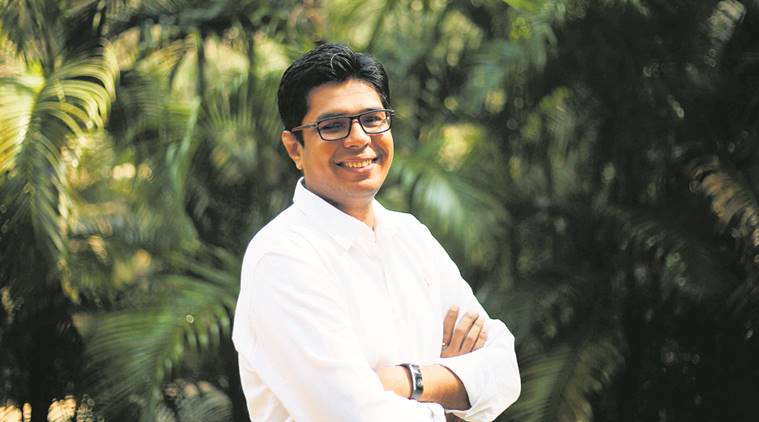Written by Ektaa Malik |Updated: March 12, 2019 12:11:05 am
Imagine, it isn’t hard to do
Writer Divya Prakash Dubey on writing October Junction, ‘nayi-wali Hindi’ and small town stories.

The latest offering by writer Divya Prakash Dubey — October Junction, a novella — is almost Inception-esque, where dreams play a significant role. It starts in Banaras, where Dubey spent some time, and is about two writers on their respective journeys. “I have tried to capture the fantasy of being a writer. The two lead characters end up being writers. While one, Chitra Pathak, wanted to be one from the beginning, Sudeep Yadav’s discovery that he can be a writer, becomes his journey. Usually, every character in a story wants something, and Yadav has everything at the age of 25. What’s left is to rediscover the imaginary world he’d conceived as a young boy,” says Dubey, an emerging new voice in Hindi writing. Dubey, in the past, penned Terms and Conditions (2013) and Masala Chai (2014) — collections of short stories, and a novel titled Musafir Cafe (2016). October Junction is Dubey’s second novel. The writer is a regular at literature festivals and poetry sessions around the country. He also does ‘StoryBaazi’ — a form of storytelling, where he interacts with the audience and makes them a part of his narrative.
Dubey’s writings combine literary traditions with a contemporary flair. “Nayi-waali Hindi”, is the term he uses to describe his style of writing, which he feels lessens the gap between spoken and written Hindi. We see liberal helpings of words like ‘seriously’, ‘flight’ and reference to Facebook and social media among others. And it’s not just the use of English words, that makes this style ‘new’, it’s the way they are written, without the heaviness and structure associated with traditional Hindi literature. It’s like overhearing a conversation in a mall, or at an airport. “ The problem with contemporary Hindi literature is that the characters know they are out of a book. They speak in that measured, enunciated tone, which doesn’t happen in real life. My medium alone is Hindi, but the world that Chitra inhabits, is well, the same as yours. She goes to the same pizzeria on Assi Ghat that perhaps you would,” adds 36-year-old Dubey.
He adds that this new style of writing stems from an anxiety of expression. “2003 and 2004 were landmark years for us. Incoming calls became free on cellphones and private engineering colleges and universities came through. Call centres came up in a big way, and one could get a job just on the basis of one’s ability to speak English. But while the world was changing outside, the language and literature were not. We spoke a different vocabulary in office and classes, there was a huge gap in between what we spoke in the canteen or at the chai ki tapri. What was spoken in the canteen was more real. That’s the nayi-waali Hindi. There are people who write emails in English, but speak in Hindi for everything else,” elaborates Dubey.
Career-wise, Dubey chose the traditional path. He studied engineering in Roorkee, and then pursued an MBA. He then got placed in a top MNC. But his heart was never in it. He used to write in college, and had written copy for an ad agency. “I had grown up surrounded by the writings of Rajneesh and Hindi pulp fiction, courtesy my father. These were two extremes. But I am glad for they existed for me. I later read a lot of Hindi literature while attempting civil services exams. I read everything I could lay my hands on. That set the tone for me,” shares Dubey, who started holding storytelling sessions at his workplace. “I started writing stories not because they would be published, but because they would be heard. I did it for 13 weeks. Eventually they got published and things started happening,” says Dubey, who moved to Mumbai in 2011.
October Junction is replete with literary references, a homage of sorts to his reading days. One sees a mention of Murakami, Kabir, Amish; even Chetan Bhagat makes an appearance. “In fact, in Musafir Cafe, I had woven about 12-13 of my favourite Hindi books. Some readers wrote to me, saying that they came to know of these classics through my work. If I am able to motivate some people to read, then why not?,” says Dubey, who adds in the next breath that it’s not his job. He is often plagued by the question about steps one needs to take to advance Hindi . “Par bhasha ko badhane ka kaam lekhak ka nahin hai. Or all Hindi professors would be writers. And if we continue on this tangent, then we might have a filter, that first do a Phd in Hindi and only then you can be a writer,” he says.






















No hay comentarios:
Publicar un comentario